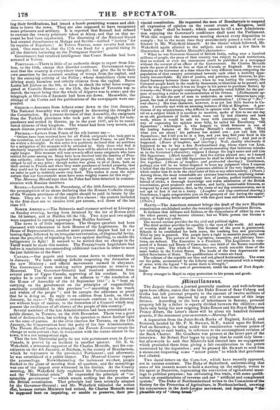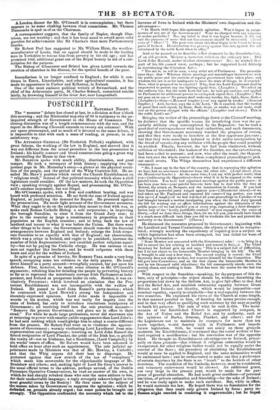.filistellantotts.
The Leipzic Gazette, a journal generally cautious and well-informed upon home affairs, states that the late Duke Ernest of Saxe Coburg and Gotha has left personal property to the amount of twelve millions of florins, and has not disposed by any will or testament of this large fortune. According to the laws of inheritance in Saxony, personal property left by a father is equally divided between the children ; and there only being the now reigning Duke Ernest and his Royal Highness Prince Albert, the latter's share will be about six hundred thousand pounds, if the statement proves correct. —Morning Post.
A deputation from the Joint-Stock Banks of England, Ireland, and Scotland, headed by Mr. P. M. Stewart, M.P., waited upon Sir Robert Peel on Saturday, to bring under his consideration various points of law relating to such banks, in reference to the contemplated revision of the Bank Charter. Mr. Goulburn was present at the latter part of the interview. Sir Robert Peel began by saying that he could only listen : but afterwards he said that Ministers had entered into no engagement which precluded them from giving a fair consideration to the points mentioned by the deputation ; and he pressed Mr. Stewart to send him a statement respecting some "minor points" to which that gentleman had alluded.
Two ducal letters on the Corn-law, which have recently appeared, are in curious contrast. The Duke of Sutherland, understanding that some of his tenants meant to hold a meeting on the subject, writes to his agent at Danrobin, deprecating the conversion of agricultural meet- ings to political purposes • but advocating free trade, with some qualifi- cation on considerations Of revenue and our "artificial and complicated system." The Duke of Northumberland writes to the Committee of tbo Society for the Protection of Agriculture, in Northumberland, avowing his concurrence in the Anti-League movement, and deprecating " the plausible err of 'cheep bread.' A..London dinner for Mr. O'Connell is in contemplation ; but there appears to be some clashing between rival committees. Mr. Thomas Duncombe is spat an of as the Chairman.
A correspondent suggests, that the family of Napier, though illus- trious, are not wealthy ; and that it has been usual to award more solid gnerdon for achievements like Sir Charles's than mere Parliamentary thanks.
Sir Robert Peel has suggested to Mr. William Hirst, the woollen- manufacturer of Leeds, that an appeal should be made to the leading men in Yorkshire to rescue him from poverty in his old age ; and has promised 100/. additional grant out of the Royal bounty in aid of a sub- scription for the purpose. The Bishop of Gloucester and Bristol has given 2,000/. towards the erection of churches in his diocese, for the special benefit of the poor.
Incendiarism is no longer confined to England ; for while it con- tinues in Essex, Lincolnshire, and other agricultural counties, it has made its appearance in Carlow and Kilkenny, in Ireland.
One of the most eminent political writers of Switzerland, and the chief of the Aristocratic party, M. Charles Schnell, committed suicide late/y, by drowning himself in the river Aar, near Langenthall.



























 Previous page
Previous page